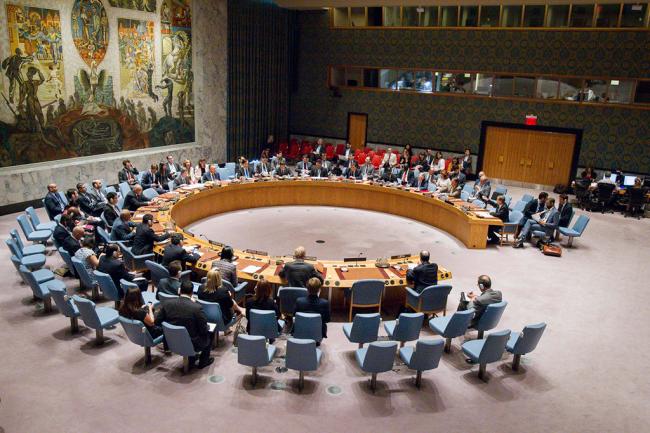
Progress in Libya marred by ongoing volatile security situation and economic challenges – UN envoy to Security Council
“On Tuesday more than ever, strong action is needed to convince Libyan stakeholders to build institutions that are open, participatory and able to address the needs of all of its citizens,” the Secretary-General’s Special Representative for Libya, Martin Kobler, said in his remarks to a UN Security Council meeting on the country.
Drawing attention to the challenging security situation, further illustrated by the most recent violence in the country’s Oil Crescent area, Kobler called for an immediate cessation of hostilities to prevent any damage to the country’s important oil industry – its only source of income.
“Libyan natural resources belong to all Libyans,” he said. “They must be protected and exported legally under the authority of the Presidency Council (PC). Otherwise, Libya’s citizens will pay the price.”
Kobler also heads the UN Stabilization Mission in Libya (UNSMIL), which the Council has tasked by with supporting the Libyan political process through mediation and good offices. In addition, UNSMIL is mandated to conduct human rights monitoring and reporting, support key Libyan institutions and efforts to secure uncontrolled arms, the provision of essential services and delivery of humanitarian assistance, and coordination of international assistance.
Libyan natural resources belong to all Libyans
In his remarks, Kobler further informed the 15-member Council that forces loyal to the PC made progress in ousting the Islamic State in Iraq and the Sham (ISIS) from its last remaining stronghold, the city of Sirte, in northern Libya.
Expressing hope that ISIS will no longer hold territory in Libya, he cautioned that the terrorist threat in the country will remain and that it will require continued vigilance.
Political developments
Turning to the political developments in the country, Kobler said that the country’s House of Representatives recently rejected the current Government of National Accord that provided an opportunity for the PC to seek the endorsement of a unity government.
“Efforts must now be exerted to ensure that the House of Representatives and the Presidency Council work together towards meeting this important milestone,” he said and noted that though there are differences of opinion on the Libyan Political Agreement, there is a clear recognition of its framework and value.
“It remains the only way forward in Libya’s transition,” he added.
In his briefing, SRSG Kobler noted that UNSMIL, on 31 August, started a round of discussions with Libyan and international experts on national reconciliation.
“It is but a small first step of a process leading towards healing the wounds of the past,” he said, adding, “We should help the Libyans find in themselves the willingness to forgive and overcome the past, and to build a new future together.”
The Special Representative also reported that an agreement was recently signed between representatives of the cities of Misrata and Tawergha, which would allow a number of internally displaced persons to start returning to their homes before the end of the year. He noted that the agreement would give hope to the hundreds of thousands of internally displaced persons (IDPs) in the country.
According to the UN Office for the Coordination of Humanitarian Affairs (OCHA), Libya’s armed conflict and political instability has impacted more than three 3 million people across the country. An estimated 2.44 million people are in need of protection and some form of humanitarian assistance – this includes IDPs, the non-displaced conflict affected population, refugees, asylum-seekers and migrants.
Also in his briefing, the UN official underscored the importance of strengthening the fundamental economic situation in the country.
He pointed out that government spending on salaries and subsidies are at 93 per cent of its total budget which itself is at a 75 per cent deficit, resulting in in the imposition of strict capital controls and the lack of liquidity.
“All our efforts can only succeed if the Libyans address the country’s growing economic crisis,” said Kobler. “To do so, it is imperative that the pipelines open, Libyan financial institutions become unified, and a national budget is approved.”
Photo: UN
Source: www.justearthnews.com
Support Our Journalism
We cannot do without you.. your contribution supports unbiased journalism
IBNS is not driven by any ism- not wokeism, not racism, not skewed secularism, not hyper right-wing or left liberal ideals, nor by any hardline religious beliefs or hyper nationalism. We want to serve you good old objective news, as they are. We do not judge or preach. We let people decide for themselves. We only try to present factual and well-sourced news.







